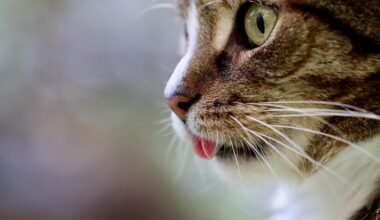Stress and Its Effect on Feline Pancreatitis
Feline pancreatitis is a critical health concern for cat owners. It often presents as inflammation of the pancreas, causing various clinical symptoms that can significantly impact a cat’s quality of life. One notable cause of this condition can be high levels of stress. Understanding the correlation between stress and pancreatitis is vital for effective cat care. Stress can trigger physiological responses in cats, including the release of hormones that affect the digestive system, including the pancreas. These hormonal imbalances can exacerbate or initiate pancreatic inflammation, leading to pancreatitis. Stressful situations may be triggered by environmental changes, loud noises, or conflicts with other pets. Observing your cat’s surroundings is essential in preventing excess stress. Regularly assessing their environment for potential stressors can help mitigate risks. Moreover, understanding your cat’s unique stress triggers can assist in maintaining their overall well-being. Providing a stable and calm environment can lead to improved health outcomes and reduce the incidence of conditions like pancreatitis. Regular vet check-ups and monitoring are also key to managing this disease.
In addition to creating a stress-free environment, cat owners should consider various behavioral and environmental modifications to alleviate stress. Creating structured routines for feeding and playtime can provide a sense of security to your feline. Also, implementing separate spaces for multiple pets may significantly reduce conflict-related stress. Monitoring your cat for signs of anxiety can also help. Common indicators include excessive grooming, hiding, or aggressive behavior. Consultation with a veterinarian is crucial for the best treatment approaches. In some cases, veterinarians might suggest behavioral therapy or medications to address anxiety. Furthermore, introducing calming products like pheromone diffusers or stress-relief toys can foster a more relaxed atmosphere. Regular engagement in playtime and interactive activities can also significantly redirect a cat’s focus from stress-inducing elements. Nutritional supplements formulated for stress relief may further aid in relaxation. It’s essential to maintain open communication with your vet to ensure you’re implementing the best practices for your cat’s specific needs. Prevention, combined with timely intervention during stressful periods, can greatly enhance your cat’s well-being and help manage conditions like pancreatitis.
It is essential to recognize how stress may present in your cat before it develops into severe health issues like pancreatitis. Proactive measures can make a significant difference in your cat’s health trajectory. Regular veterinary exams are vital for diagnosing potential issues early and ensuring comprehensive health monitoring. Keeping track of your cat’s body weight and any sudden changes in appetite can also provide insights into their health status. Cats may exhibit subtle signs of discomfort, such as decreased activity or altered grooming habits. Identifying these signs and correlating them with potential stressors can prompt more effective intervention. Create a calming sanctuary within your home, providing high perches or cozy hiding spots that help your cat feel secure. Avoid sudden changes in the environment that may lead to anxiety. It’s equally important to ensure a quiet and peaceful atmosphere during feeding times. If you notice a pattern of stress affecting your cat’s health, professional advice becomes increasingly important. This can include tailored nutritional plans or anxiety medication, if deemed necessary. By understanding and addressing these factors, owners can contribute to enhancing their cat’s quality of life.
Competing for attention in households with multiple pets can create stress, triggering health problems such as pancreatitis. Cats are naturally solitary creatures and often value personal space, making shared environments challenging. It is important to create designated feeding areas and personal territories for each cat, allowing them to feel secure and independent. Offering vertical spaces, such as cat trees and perches, enables animals to escape potential conflicts, thereby reducing stress. Engaging in one-on-one playtime with each cat can also help foster trust and reduce tension. Moreover, establishing a clean and odor-free environment can reduce stress as well. This includes regular litter box cleaning and maintaining hygiene around feeding areas. Investing in high-quality food that suits your cat’s dietary needs will also contribute to their overall well-being. Additionally, introducing new pets or moving to a new home should be done gradually to prevent overwhelming your cat. Monitoring interactions closely during this transitional period is vital. Prioritizing feline mental health significantly influences their physical health, especially regarding conditions like pancreatitis, supporting an overall healthier lifestyle.
Recognizing Signs of Stress in Cats
Recognizing signs of stress in your cat can be crucial in preventing severe health conditions like pancreatitis. Stress symptoms can vary, manifesting physically and behaviorally. Observing your cat’s behavior closely is critical. These indicators may include excessive meowing, hiding, or changes in eating habits. Some cats may grow more aggressive or display compulsive grooming behaviors during periods of stress. Taking the time to understand your cat’s daily routine and typical behavior is key to identifying when something is amiss. Changes in litter box habits, such as urinating outside of it, can also be an important signal of stress. If your feline is exhibiting these symptoms, it’s wise to assess their environment for potential stressors. Is there a new pet in the house? Have there been changes in family dynamics? Identifying and addressing these changes can improve your cat’s emotional state. A stable environment helps foster overall well-being, ensuring a happy and stress-free cat. Ultimately, responding quickly to signs of distress holds the potential to mitigate the risks associated with feline pancreatitis and improve quality of life.
Furthermore, stress management techniques can play a significant role in relieving anxiety, thus decreasing the risk of conditions like pancreatitis. Engaging in activities beneficial for both owner and cat strengthens bonds and helps create a nurturing environment. Regular playtime not only provides physical exercise but mental stimulation too, which is vital for maintaining a happy cat. Alternative therapies such as cat massage, gentle brushing, or even pet yoga can foster relaxation and support emotional well-being. Implementing daily routines that promote interaction and affection helps to build confidence. When cats feel secure in their home environment, they exhibit less stress and anxiety, contributing to overall better health. There are also specialized stress-relief products available on the market, including herbal supplements designed to soothe anxious felines. Consulting a veterinarian to find the right products or solutions tailored to your cat’s needs is highly recommended. Creating a positive environment is necessary to counteract any anxiety triggers. With consistent efforts, you can significantly enhance your cat’s emotional and physical health, subsequently reducing their chances of developing pancreatitis.
Implementing all these practices can greatly benefit not only their mental health but also their physical health in the long run. Furthermore, as an owner of a cat, prioritizing your pet’s emotional well-being can pave the way for lasting changes. Recognizing the specific factors contributing to your cat’s stress will help in addressing their individual needs more effectively. Engaging your cat regularly through interactive toys or training exercises fosters a sense of companionship. It is essential to validate your cat’s feelings and provide support during stressful times. Regular vet visits will also allow for a holistic approach to managing your cat’s health. Discussing your concerns regarding stress and connecting them to physical health issues can lead to actionable solutions. Creating a richer emotional experience through play and social interaction ensures your cat feels loved and secure. Ultimately, a happy and healthy cat is achieved through positive emotional engagement and stress management. By following these guidelines, owners can help alleviate issues related to feline pancreatitis and encourage their cats to thrive.
To sum up, the nexus between stress and feline pancreatitis cannot be underestimated. Owning a cat requires understanding their unique psychological and physical needs, and stress management must be a priority for any responsible cat owner. Through attentive observation, proactive stress reduction techniques, and preventive healthcare, the risks associated with feline pancreatitis can be significantly decreased. Creating a supportive home environment built on routine and security can help enhance your feline’s experience of life. Identifying stress-promoting factors and addressing them head-on is key to promoting a healthier lifestyle for your cat. Continue to seek advice from professionals regarding behavioral or medical treatments, ensuring you have the best resources at your disposal. Supportive owners play a pivotal role in their cats’ well-being, equipping them to navigate their emotional landscapes. By working together with your cat, you build a partnership that leads to a fulfilling life for both of you. When cats are kept calm and secure, they are less likely to develop severe conditions like pancreatitis. Finally, investing time in understanding your cat’s needs will lead to a more satisfied and healthier feline companion.


